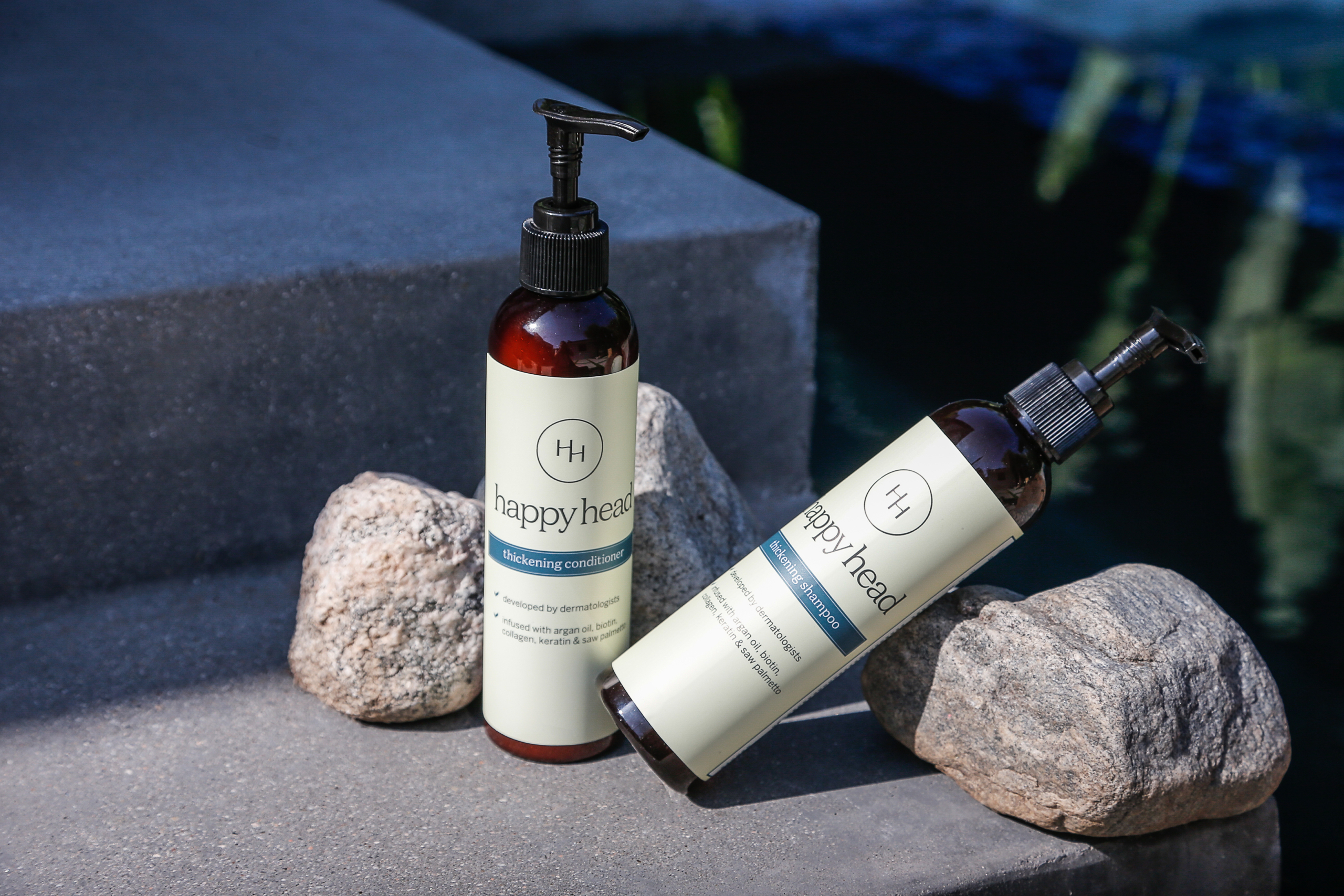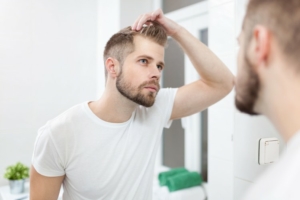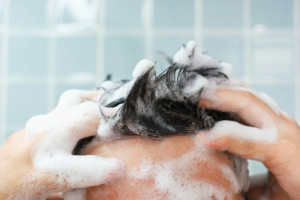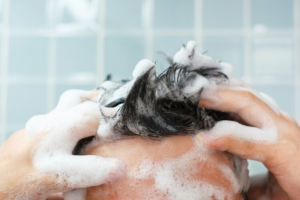An Honest Review of Happy Head’s Thickening Shampoo & Conditioner

Is your shower lined with bottles of partially full shampoo and conditioner? Mine is, and it drives my partner crazy. So, when I decided to try Happy Head’s new Thickening Shampoo and Conditioner, I got the “Really? Like we need more clutter” look. Of course, I had a good reason for wanting to try it.
About 13 years ago, I was diagnosed with Lichen Planopilaris. It’s an autoimmune disease and a type of scarring alopecia that occurs when your body attacks your hair follicles. Inflammation causes scars over the follicles, eventually closing them off so hair can no longer grow. You have to play beat the clock to get the inflammation under control so the hair follicles stay open. I was fortunate that my dermatologist was able to get my hair into remission and the damage was isolated to areas that I can cover with a good haircut. I was off all of my medications and done with treatments for over 10 years.
During Covid, though, my hair loss reared its ugly head. My dermatologist put me on a regime that included Finasteride and Minoxidil. Thankfully, the shedding slowed, and new hair started to sprout. For some reason, though, my hair felt really dry and didn’t look the healthiest. So, I decided to try out Happy Head’s shampoo and conditioner to see if it would help. Here’s my honest review.
I Tried Other Thickening Shampoos & Conditioners First
Weary paying a small fortune for my stylist’s overpriced recommendations that never seemed to work, I started cruising Facebook groups to see what fellow alopecia warriors were recommending. I finally settled on Bondi Boost after reading a lot of positive reviews about the brand. And, at first, I was happy with the choice. I really liked the peppermint scent and the clean, tingly feeling that the suds gave my head. My hair felt super soft, too. That all changed in the following weeks, though. I found that the shampoo left a film that was hard to wash out, and before I knew it, the build-up made my hair look just as dried out and blah as it did before I started using it.
Ingredients Matter When it Comes to Hair Care Products, Especially When You Have Alopecia
Curious about whether Happy Head’s shampoo and conditioner would make my hair look healthier, I researched the formula. Sure enough, I found plenty of intel on the ingredients that made me think, “Aha, this stuff might work.” Here’s what I learned.
The active ingredients in Happy Head’s shampoo and conditioner formulas are selected specifically for people dealing with thinning or balding hair. Every ingredient has a purpose. Let’s start with saw palmetto. Extract from saw palmetto, a tree with palm-like leaves that grows up to ten feet tall, acts as a DHT blocker. It works like a mild, all-natural version of topical Finasteride to prevent Testosterone from converting to Dihydrotestosterone (DHT).
Collagen and keratin help thicken, volumize, and protect your hair. As you age, your body produces less collagen, which is responsible for helping your skin and hair maintain its elasticity. When applied topically, collagen can help replenish the cells in your dermis, keeping your scalp and hair follicles healthy, allowing for thicker, stronger hair to grow.
Keratin is a fibrous protein found in your hair, skin, and nails. One research study published in 2017 in the Journal of Investigative Dermatology found that a keratin-based treatment significantly improved hair growth among men with male pattern baldness. After 24 weeks, the mean hair count increased by over 29 percent in the treatment group compared to almost 10 percent in the placebo group. The keratin-based treatment also significantly improved hair thickness and density. Then, there’s argan oil and biotin, known for moisturizing and strengthening.
Happy Head’s Shampoo & Conditioner Duo Made My Hair Feel Softer and Look Shinier
After my experiences with other shampoos and conditioners, I had low expectations for Happy Head. Months later, though, I’m still using the Happy Head products and am pleased with the results.
Here’s what I found:
Happy Head’s shampoo and conditioner have a mild, fresh scent. I find the scent relaxing and peaceful, like a product you would find in an upscale spa. The system also gave me the results I was looking for in terms of making my hair feel soft and sleek, even months after using it. You know how gray hairs have a wiry texture that’s different from the rest of your hair? They proudly stick out, announcing to the world, “Hello! Here I am!” Thankfully, Happy Head tamed those too.
I Didn’t Expect Happy Head’s Shampoo & Conditioner to Reduce Shedding, But it Did
Now, here’s the best part. When I started using Happy Head’s shampoo and conditioner, my dermatologist told me my hair loss had stabilized. From her perspective, I was out of the woods, and she wasn’t concerned about shedding.
My bathroom sink was telling me a different story, though. Every time I brushed my hair, I would find about 15 strands waiting to be cleaned up. A few weeks after using Happy Head’s thickening shampoo and conditioner, I noticed that the 15 strands were reduced to about three to five.
There Are Some Tricks & Tips You Can Use to Help Make Your Hair Look Healthier
I used Happy Head’s thickening shampoo and conditioner as any other. The bottles come with handy pumps for easy dispensing. My hair is short, so I only need one pump. If your hair is long, you may need two pumps. Massage the shampoo evenly into your wet hair and scalp, and rinse. Then, apply one to two pumps of the conditioner and massage it into your hair. This time, don’t rinse right away. Let the conditioner sit for a few minutes to let the formula absorb, then rinse.
If you’re like me and wash your hair every day and occasionally twice on the same day, you may want to rethink that. According to Dr. Ben Behnam, board-certified dermatologist, and Happy Head Co-Founder & Chief Medical Officer, washing so often will strip your hair of essential oils that are needed to protect your hair against breakage. He suggests washing every other day instead. If you’re like me and exercise a few times a week or are active, the idea of not washing your hair may make you think, “blech.” If that’s the case, rinsing with water will do the trick without drying out your hair. You can also rinse with water and use conditioner without shampooing.
Shampoo & Conditioners Are No-Risk Products
When you’re dealing with male or female pattern hair loss, alopecia areata, or any other type of alopecia, it’s only natural to question whether you should use certain products. The idea of doing anything that could result in further hair loss is nerve-wracking. I’ve been there.
Here’s a reality check, though. The odds of shampoos and conditioners causing problems are minimal, if at all. You don’t have anything to lose. I’m glad that I tested out Happy Head’s new shampoo and conditioner, and recommend you try them too. There’s even a special introductory offer for 30 percent off on your first order when you add them to your cart.
Disclosures: Although I’m a writer, I’m pretty busy and rarely write product reviews. Between juggling work and family, I just don’t have the time. However, when we launched our thickening shampoo and conditioner, I was curious to see how the products would work. I had already tried so many. What was one more? Happy Head gladly gave me a set of complimentary bottles to try. Happy Head, however, did not ask me to write this review. I volunteered to write it because I truly believe in these products.
Now, I can’t guarantee that my results are typical and everyone will have the same experience. As mentioned earlier, besides Happy Head’s shampoo and conditioner, my protocol includes Finasteride, Minoxidil, and other medications designed to stop my hair loss and promote growth. As frustrating as it is, there are different types of alopecia (male and female pattern hair loss, alopecia areata, frontal fibrosing alopecia, etc.) and people’s body chemistry varies, which can affect the efficacy of hair loss products.
If you decide to give Happy Head’s shampoo and conditioner a trial run, we’d love to hear from you. Be sure to contact us and let us know what you think.








